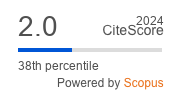Multivessel Disease Patients’ Outcome and Second Generation Stent: Is Syntax Still a Valid Score? A RealWorld Study from a Tertiary Center
DOI:
https://doi.org/10.5644/ama2006-124.316Keywords:
Multivessel Disease, Percutaneous Coronary Intervention, SYNTAX Trial, Dual Antiplatelet Therapy, OutcomeAbstract
Objective. The SYNTAX trial was designed to evaluate whether multivessel disease patients could benefit from percutaneous or surgical revascularization using a paclitaxel eluting stents, but after the introduction of second generation stents, this score needs to be reevaluated. The aim of our study was to analyze the association between SYNTAX score and the prognosis of multivessel patients submitted to percutaneous coronary intervention (PCI) and second generation everolimus eluting stents (EES) implantation.
Materials and Methods. Data on 289 patients with multivessel coronary artery disease submitted to PCI with EES were stored in a dedicated database and retrospectively analyzed. During a mean follow-up period of 14.4±6.4 months, major adverse cardiac and cerebrovascular events (MACCE) including death from any cause, myocardial infarction, target lesion revascularization (TLR) and stroke, were systematically assessed.
Results. The incidence of MACCE at follow-up was 13.1%; death from any cause occurred in 19 patients (6.6%) and myocardial infarction in 9 patients (3.1%). TLR was detected in 2.7% of patients and stroke was observed in 2 patients. The SYNTAX score did not prove to be an independent predictor of overall death at multivariable analysis.
Conclusion. At mid-term follow-up, the incidence of MACCE in multivessel disease patients submitted to PCI and EES implantation was low; no significant association was found between SYNTAX score severity and MACCE at follow-up, suggesting that it should be modified after the introduction of EES.
Downloads
Published
Issue
Section
License
Copyright (c) 2021 Cristina Giglioli, Niccolò Marchionni, Alessio Mattesini, Chiara Zocchi, Manuel Biagioli, Marco Chiostri, Salvatore Mario Romano, Emanuele Cecchi

This work is licensed under a Creative Commons Attribution-NonCommercial 4.0 International License.





